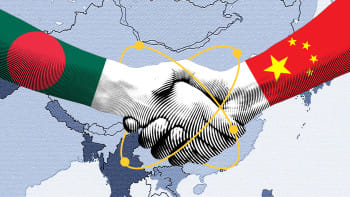A striking 82.7 percent of the youth population, especially first-time voters, said they were not interested in joining politics or participating in political activities.
Most of them cited fear of political violence or backlash (58.7 percent) as the main reason, along with concerns about graft and a lack of ethics in politics (56.4 percent).
Only 1.6 percent of the youth population is currently involved in some form of political activities, revealed a nationwide survey conducted by the South Asian Network on Economic Modelling (SANEM) in collaboration with ActionAid Bangladesh.
The survey report, based on 2,000 respondents aged between 15 and 35, representing a significant portion of first-time voters, was released at a programme at the Brac Centre Inn yesterday.
The finding comes in the wake of a youth-led uprising that toppled an autocratic regime just last year.
However, 76.78 percent of the youth expressed a desire to vote in the upcoming election, while around 80.73 percent were optimistic that this time it would be free and fair.
The 2014, 2018, and 2024 national elections were marred by controversy, including opposition boycotts, allegations of vote rigging, and low voter turnout.
The survey further showed that 38.76 percent of the respondents felt the BNP would poll the highest votes in the upcoming election, followed by 21.45 percent for Jamaat-e-Islami Bangladesh, 15.84 percent for the National Citizen Party (NCP), and 15.02 percent for the Awami League if it is allowed to contest.
Of the respondents, women felt more strongly that both the NCP (17.47 percent) and the AL (15.61 percent) would get more votes.
In rural areas, especially Mymensingh, more people felt the AL would fare well in the polls, while those in urban areas, including Dhaka and Chattogram, felt the same about the BNP and NCP. Meanwhile, the sentiment was evenly split when it came to Jamaat, though its support was poorest in Dhaka.
Opinions were almost evenly divided on whether religion-based politics is conducive to Bangladesh's development. While 51.77 percent replied in the affirmative, 48.23 percent disagreed.
Among Muslim respondents, 58.14 percent supported religion-based politics, in stark contrast to 87.77 percent of non-Muslims who opposed it.
Gender-wise, men were more prone to support religion-based politics.
Around 77.2 percent of those who opposed religion-based politics said they had varying levels of anxiety about the growing presence of religion-based parties.
Asked whether religious minority groups are safer in the current scenario, 78.83 percent of respondents said yes, while 21.17 percent disagreed.
Among Muslim respondents, 84 percent believed minorities are safe, while 46.76 percent of non-Muslims felt the same.
However, nearly half of non-Muslim respondents said people are not currently free or safe to practise their religion without fear.
The survey covered all eight divisions of Bangladesh. Two districts were selected from each to ensure geographic and demographic representation.
These included Rangpur, Lalmonirhat, Netrokona, Mymensingh, Sylhet, Sunamganj, Chattogram, Cumilla, Barishal, Jhalakathi, Khulna, Satkhira, Dhaka, and Munshiganj.
A near-equal distribution across rural and urban areas, and between men and women, was maintained while conducting the survey.
A significant majority of the youth said current social and political issues are increasingly disrupting daily life.
The most cited concern was the rise in arson, robbery, and theft, mentioned by 80.2 percent of the respondents; mob violence was identified by 71.5 percent, while 56.2 percent pointed to politically biased arrests and legal proceedings.
Over half of the respondents were alarmed by gender-based violence, while 44.2 percent expressed concern over social backlash against feminist or liberal views. Another 61.2 percent were worried about unsafe public spaces, especially for women.
The study also highlighted the youth population's disengagement with ongoing reform processes.
Of the respondents, 43.5 percent said they were unaware of the reform initiatives underway.
Asked to rank priority areas for immediate reforms, an overwhelming 94 percent identified education system reforms as "very urgent", followed by health sector reforms at 92 percent, and labour market reforms at 90 percent.
They also called for political party reforms. Asked what kind of changes they expect in this regard, 60 percent called for an end to patronage, nepotism, and political violence.
Another 52.7 percent wanted a shift toward policy-based politics rather than personality- or legacy-driven leadership, and 47.5 percent emphasised the need for greater transparency in party funding and internal democracy. Meanwhile, 43.6 percent of the respondents called for greater inclusion of youth and women in leadership roles.



 For all latest news, follow The Daily Star's Google News channel.
For all latest news, follow The Daily Star's Google News channel. 


